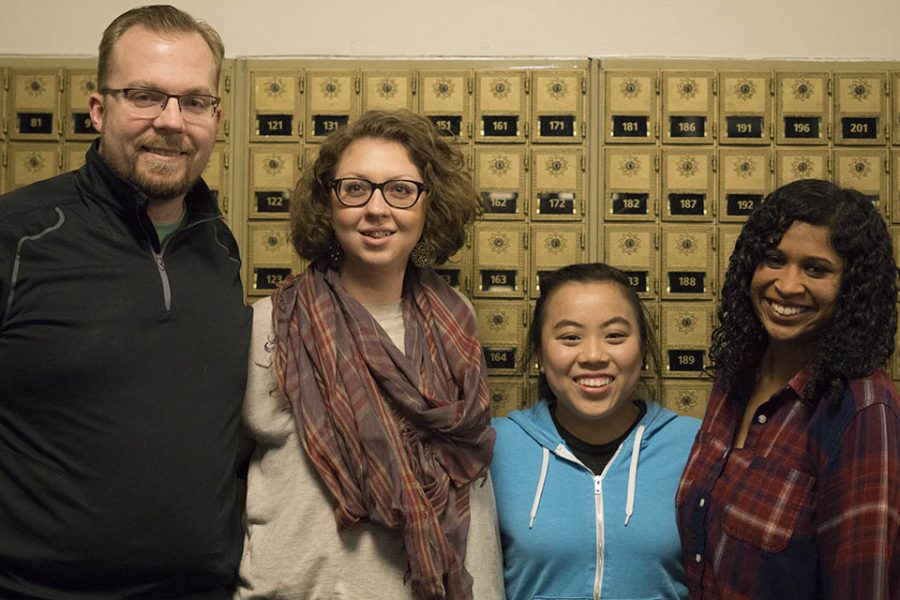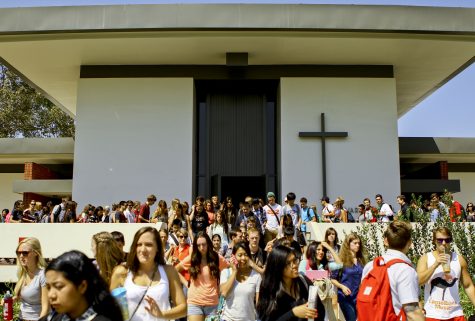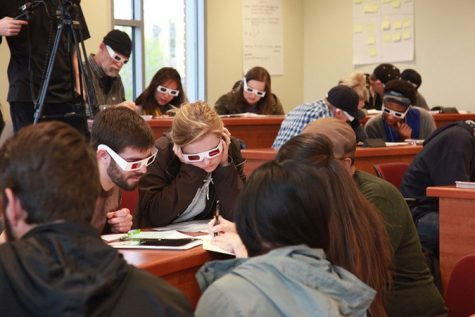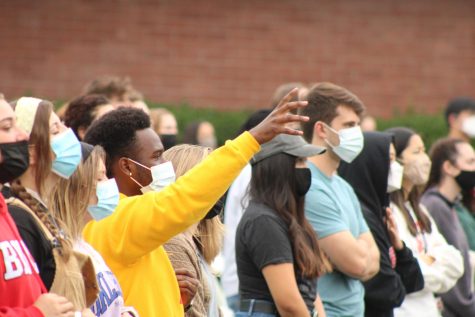Groups get down to business
Six finalists in Biola’s Startup Competition speak on the anticipation leading up to the announcement.
March 15, 2017
Pitches have been made, the decision in process. One team will rise above the rest, while the rest may choose to proceed with their business as they see fit: continue building their nonprofit or drop the idea. Biola’s annual Business Startup Competition is coming to a close. The teams left range from shower caddies to missions, from children’s books to global resources, and beyond. Either way for each team, uncertainty lies ahead.
Columbus International
Biola foreign exchange students have the capacity to complete a study abroad program in the U.S. after having grown up in another nation. However, many graduate without a full assimilation into American culture and can hardly hold a conversation in English, according to James Brannon, alum and founder of a non-profit committed to recognition of culture in study abroad programs. An American citizen himself but raised in China until he came to Biola, this concept hits home.
“It really makes you question what the whole purpose of their study abroad is, if you can’t even speak English well,” James said in a phone interview. “The big idea behind this is that this will help international students assimilate more effectively to life in the U.S… The biggest thing for international students coming to the U.S. is assimilating to the culture.”
As far as the business is concerned, James stresses the importance of partnering with the local church to help international students feel more connected and provide resources for assimilation into the culture they are studying in. Should the team win, James agrees to take the victory with humility and eagerly accept any criticism the judges may give the team in proceeding with their model. Should they lose, the team will not drop the company, and will likely continue pushing to help international students, like James’ wife Gracey Brannon, assimilate into U.S. culture in educational ways.
Illuminate
“Less than 10 percent of books are [culturally] diverse,” said Jordan Perkins, senior business major and dreamer behind the nonprofit Illuminate books. “We really want to make those cultural stories available so the parents can have those kinds of conversations with their kids.”
The company’s slogan is “Leaving no child in the dark,” a fitting description of their mission and drive behind entering the business competition. Perkins admits to a deep call in pursuing this company, and expresses conviction at the lack of education and cultural awareness in children’s books — a reflection of the importance society fails to place on both areas.
The team’s goals revolve around educating teachers abroad. Illuminate plans to use any money made from selling children’s books with an emphasis on diversity to send educators into poverty-stricken countries with little access to education. Should the team win, Perkins is steadfast in knowing the company will succeed and has planned steps for the next few years, should finances remain steady — she plans to send her first team of educators out within the next two years after visiting the countries they will focus on. Should the team lose, her mission stays and her dream lives on. Though she admits the struggle will be formidable in the realm of finances and legal help, she and her husband will continue pursuing this idea in earnest through donations and support-raising.
Mission Link
Sarah Brummel, third year intercultural studies master student, came to Biola following what she believes is a sign from God in the form of a miraculous glitch in her iPhone. A screen loaded on Safari without her actively searching, showing her Biola’s Cook School of Intercultural Studies, which she had never heard of before. However, the school offered exactly what she needed to get the slowly growing non-profit business idea off the ground. Other team members are Sarah’s husband Jeremiah Brummel, and two other Biola undergraduate students: sophomores Elaine Fung, communication major, and Andrea Paul, business major.
“We’re looking at ways to grow churches while also providing support for missionaries,” Sarah said. “Support is really the thing — if they’re not feeling connected, they’re feeling forgotten. It’s a biblical mandate that the church should be fulfilling, but what we’re seeing is that churches just don’t know how.”
In a few ways, Mission Link will ideally have the ability to provide missionaries in the field with help and support: promo videos, education of home churches on how to help, sending friends and bringing home missionaries as an encouraging respite. Sarah is confident in how the company will move forward past the announcement — for good or ill. She has bright hopes in a future for the business regardless of prize money or legal help, and expresses how the reward will not stop the motivation from existing in her team and her dream.
Raptor House Effects
As alum cinema and media arts majors, Jesse Velez and Cameron Boyce began their own special effects company. After spending weeks on the business plan, containing eleven comprehensive sections, the team remains confident. With presentation day approaching, the team looks forward to sharing their passion with the judges.
“Because we’re a special effects company we’re going to be presenting in a world that a lot of people don’t know about. We’re really excited to show the judges and whoever’s there to watch the kinds of work that we do and that this is an actual job that people do for a living,” Velez said.
Through the business plan, Velez explained how the vision of the team became a reality, in seeing how they could do something they love and make money. Velez and Boyce hope to branch out on their own after the end of the business competition, whether they place in the top three or not.
Liftd
In a bold move, the team headed by sophomore business and philosophy major Melissa Ann Sugeng aims their Premium Shower Tote exclusively toward the collegiate female market. Junior business major and member of the team Megan Harlander explains in detail the reason behind this and the benefit of having a closed market for a product in a small startup.
“Most shower caddies are very similar, they all have the same features. Ours is high-quality, we’re offering a luxury, premium brand,” Harlander said. “If we limit ourselves to just [marketing to] females, we can really focus on narrowing their needs.”
If the team wins, Harlander elaborates, members will likely rally to create the product a reality in the near future. Should the team lose, she expressed thankfulness at the prospect of pitching an idea and getting on board with a valuable experience.
Wevene.com
“What’s interesting is that all of our teammates they’re all entrepreneurially minded, and so they all have different ideas that they want to do in the future for starting different businesses,” said Austen Dutton, team leader of Wevene.com and assistant manager of auxiliary services. “And so I really hope that regardless of what happens with this particular idea and this competition that each of us would feel a little bit more prepared and empowered to be able to pursue the ideas that God’s given us to start other businesses in the future.”
With their current idea, the team hopes to orient local businesses to market the wedding industry in SoCal for brides on a budget. As a new businessman, Dutton has learned invaluable amounts of skills he says he will use for the rest of his life. Dutton also shared how the Crowell staff has truly showed him how to honor and glorify God through ways other than full time “traditional” ministry.







